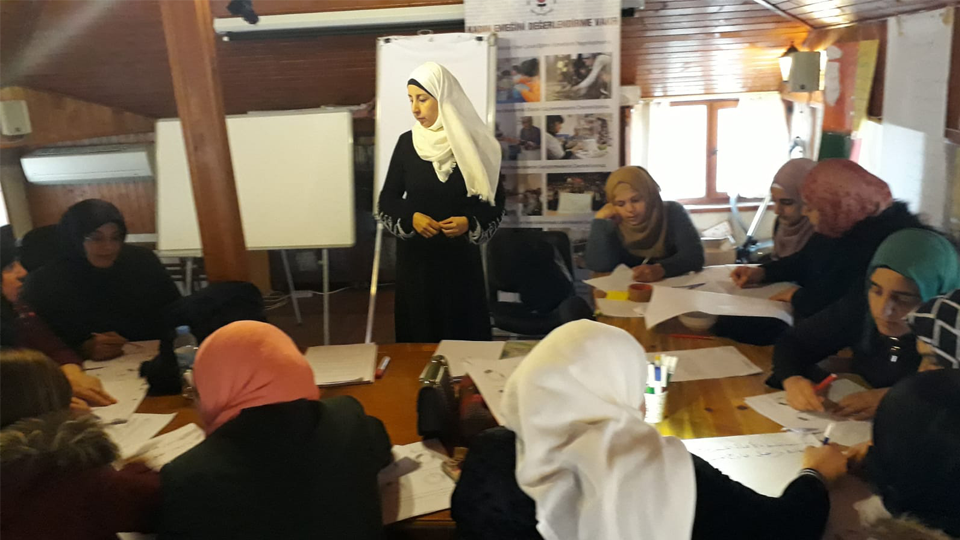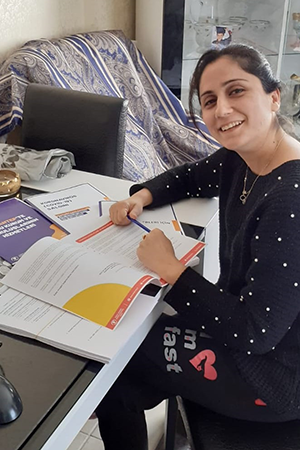Women's care burden increased during the coronavirus pandemic in Turkey
Minevver Tuvarlak is a community leader at the Women and Child Center in Gaziantep, a city located in southeastern Turkey. Women community leaders in Gaziantep supported vulnerable Turkish and Syrian women under temporary protection during the ‘stay at home’ measures that lasted between March and June, and referred women in need to service providers. Tuvarlak, who reached out to 80 women as a community leader, says that women experienced an increase in their household and care work, without sufficient support from their husbands. Their testimonies were verified by a recent Rapid Assessment published by UN Women.
Date:

Established in 2019 in Gaziantep by UN Women in partnership with the Foundation for the Support of Women's Work (KEDV), the Women and Child Center demonstrates an exemplary community-based women-led peer support and referral system.
As a community-driven model led by women, the Women and Child Center works with local leaders to support vulnerable Syrian and Turkish women in Gaziantep. Community leaders inform them about public services, disseminate information on the legal rights and entitlements of Syrians under temporary protection, available health, education, employment services, and any other information needed by women, and refer women to the appropriate service providers.
During the COVID-19 outbreak, the Center is running a Home to Home Solidarity Programme together with community leaders to support women at home via telephone and internet.
Minevver Tuvarlak, 33, is one of the Center’s 15 community leaders and has been a volunteer with KEDV since October 2019. She completed an array of training programs provided by KEDV’s experts on leadership, gender issues, and how to carry out needs assessments.
Tuvarlak says that the COVID-19 outbreak has brought many challenges. KEDV had to close the Center temporarily during the outbreak in line with the government measures and the community leaders needed to adapt to the new circumstances.

“We started to work from home. Every community leader is responsible for reaching out to 80 women. We called them one by one,” says Tuvarlak.
She says that women felt they experienced an increase in household and care work. “Women care more about hygiene and they started to clean their house more often. They also taught hygiene to children. Their partners and children asked for food consistently, so they had to cook and serve food several times during the day. Their husbands either took leave or didn’t go to work at all. They started to be more demanding on women. They didn’t help with the household chores, but their requests and wishes have increased,” she says.
The findings of the Rapid Gender Assessment of COVID-19 implications in Turkey led by UN Women Turkey echoes the testimonials of the women that Tuvarlak talked to. Conducted between 18 – 25 April 2020, the research highlights the significant adverse effects of the outbreak impacting women and men in varied ways based on their sex, location and age among other factors.
The research gathered data on various indicators to measure the relative change in peoples’ daily lives since the onset of COVID-19. Women who participated in the research said that their household and care work has increased. 78 per cent and 60 per cent of female respondents stated that their workload has increased when it came to: “cleaning (the household and washing the clothes)” and “cooking and serving meal” respectively.
The research found that a significant portion of male respondents were not doing much house and care work “under normal circumstances”, either. 41 per cent of male respondents stated that they do not cook while 25.5 per cent said that they do not clean.
“In our research, conducted in April, both women and men reported an increase in their workload in the household, however, women expressed an increase to a larger degree across all categories of domestic work. The study reveals that the pandemic has deepened the already existing gender inequalities between women and men on the labour market and in the household,” says Asya Varbanova, UN Women Turkey Country Director.
On average globally, women do three times more unpaid care work than men. Women in Turkey spend 4.3 hours on unpaid house and care work, while this is 0.9 hours for men.[1] Self-isolation measures overburden women with the unpaid house and care work as more family members spend time home.
“Coronavirus affected women psychologically as well. Women are worried more about their health and their future. Their main concerns were around financial challenges. Their stress affected their family life and they started to have more problems with their husbands and children,” says Tuvarlak. “Thanks to our extensive network in Gaziantep, we referred the women who have financial difficulties to municipalities. Many of them benefited from financial support. We were there to support women who need psychological support and organized online meetings with a psychologist. We got very good feedbacks from the women we supported,” she adds.
The research also shows the emotional and psychological impact of the COVID-19 pandemic on women and men. 54 per cent of female respondents and 49 per cent of male respondents stated that they have started experiencing stress and anxiety with the outbreak of the pandemic.
“This pandemic is not only a health crises but it is also a traumatic crisis socially, economically and culturally and forcing us to change. It deepened already existing inequalities. The most affected ones were women who have care burdens at home, refugees and disadvantaged groups. During the COVID-19 outbreak, we have protected our neighborhood through the Home to Home Solidarity Program that we launched in Gaziantep and strengthened solidarity. With this programme women empowered each other and showed leadership. Through community leaders and solidarity, we also reached other women and children in the neighborhood”, says Özge Sağaltıcı, Field Coordinator at KEDV in Gaziantep.
The center is financed through UN Women’s regional programme entitled: Strengthening the Resilience of Syrian Women and Girls and Host Communities in Iraq, Jordan, and Turkey, with support from the European Union, the EU Regional Trust Fund in response to the Syrian Crisis (the EU Madad Fund).
Commissioned by UN Women Turkey, the Rapid Gender Assessment of COVID-19 Implication in Turkey was conducted with financial support from Sweden through the Swedish International Development Cooperation Agency (SIDA). The research was based on a telephone survey among a nationally representative sample of 759 women and 749 men by a national independent research company, SAM Research and Consulting.
[1] Turkstat, Household Labour Force Survey, 2019 figures